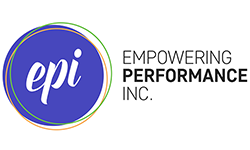Boredom's Antidote
I am inspired when I see my team members get excited about their own growth and development. As an award-winning authorized partner, EPI was invited to the recent MindLab Conference for distributors of the DiSC® workplace assessment tool.
Our team member who attended the conference returned brimming with ideas, inspired by speakers and cutting-edge research. Her excitement reminded me that professional development is the antidote to boredom. We’ve all had jobs that have bored us silly. The hours creep by. You go home feeling unfulfilled and dissatisfied. And then you have to do it all over again the next day!
Boredom is the very picture of disengagement and demotivation.
And it drives employees away, especially young managers. According to a 2016 Udemy Workplace Boredom Study, bored workers are twice as likely to leave an organization than workers who aren’t bored. Hardly surprising. But the top two reasons for employee boredom just might surprise you: Lack of opportunity to develop new skills and unchallenging work. The good news is it's fixable.
When we learn new skills and develop professionally, we feel a greater sense of mastery and purpose, two of the three fundamentals of Daniel Pink’s intrinsic motivation model. And when we’re engaged and motivated, we have a greater emotional connection with our work. The days stop dragging and so do we.
But what’s in it for the organization?
Engaged employees deliver more, which increases the bottom line.
In the 2017 Aon Hewitt study of 5 million employees worldwide, respondents chose Employee Value Proposition as their number two motivation factor. This is about organizations creating a sense of belonging and value. Employees who feel valued are more loyal, so they stay longer. That’s a big win because employee turnover costs between 30%-400% of an employee’s annual salary, depending on their level within the company.
Having a reputation as a company that values professional development attracts quality hires.
Developed employees are promotable employees. And promoting from within saves the organization money while improving morale.
Motivated employees are more creative, more innovative, and more emotionally connected to their work. That’s a win for clients. Which is a big win for everyone.
So, how can we, as leaders, increase engagement and help decrease boredom?
By ensuring our team members have ample development opportunities and supporting them in their pursuit of those opportunities. Here are some tips on how to boost your development chops:
Discover what motivates each individual team member. Then help match each person to the most motivating development opportunity for them personally.
Give as much autonomy to your team members as possible. When employees control their own development, they're more engaged and motivated.
Find interesting ways for your team to hone their job-related skills. Delegate. Assign a stretch assignment. Have them shadow a more experienced worker. Cross-train. Mix it up.
Cultivate an environment where development is encouraged and valued. This requires flexibility. You must allow your team members the time and space for development; don’t derail their efforts with arbitrary deadlines and hidden agendas. And be patient with learning curves.
Foster spontaneity. Encourage team members to follow up on items that pique their curiosity.
Ask and share. Encourage team members to ask for what and how they want to develop; if they don’t, step up and ask them directly. Then have them share the learning with the rest of the team.
Commit to making development a priority. Provide the necessary tools. Be a cheerleader, but more: Be the person who removes obstacles.
Encourage peer feedback and mentoring. Both provide prime development opportunities.
Model your own development and growth. Don’t get so wrapped up in your team members’ efforts that you forget your own professional development!
Remember that employee development is a shared responsibility. You can’t force your team members to embrace professional development, but you can create an atmosphere that encourages and rewards their commitment to it. You can help generate the excitement you hope to see.
Michelle Kelly, CEO (Chief Enjoyment Officer)


